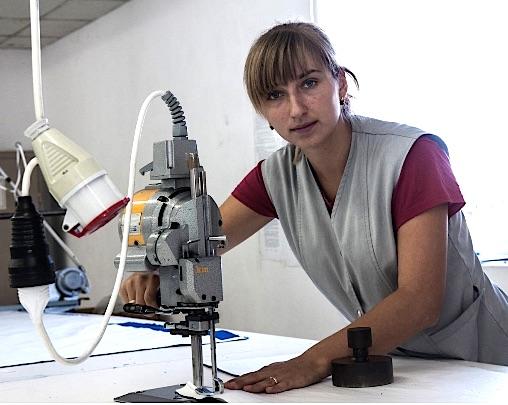
Some of the world’s most popular fashion houses have been urged to uphold labour rights in their supplier factories in eastern and south-eastern Europe.
The Clean Clothes Campaign, the Amsterdam-based champion of employment standards in the garment and shoe industry, has made the appeal to retailers including the UK company Triumph, the Italian multinationals Benetton and Geox, the Danish group Vero Moda, and Esprit, which has headquarters in Germany and Hong Kong.
A report by the campaign, known for highlighting abuse by Asian manufacturers, now targets suppliers in the former European communist bloc.
The Europe’s Sweatshops report says the employees are experienced and qualified, but underpaid, and many brands label the products Made in Europe, suggesting good conditions.
However, average monthly wages vary from €89 ($105, £79) in Ukraine to €374 in Slovakia. The campaign estimates €438 as the monthly living wage to support a Ukrainian family.
A Ukrainian woman employee is quoted as saying: “Sometimes we simply have nothing to eat.” A Hungarian worker says: “Our wages are just enough to pay for energy, water and heating.” Serbians say they are threatened with dismissal if they protest about summer working without air conditioning and access to drinking water and continually having to work on Saturdays.
Other eastern European workers complain of unhygienic conditions, exposure to heat and toxic chemicals, unpaid and illegal forced overtime and abusive treatment.
Only the Swedish multinational H&M has promised to insist on living wages at its supplier factories worldwide. The policy, announced in 2013 to be implemented in 2018, would be “ground-breaking”, says the campaign, but H&M has redefined its intentions, committing itself to introduce “mechanisms” enabling employers to pay living wages to at least 80 per cent of the supply chain workers.
Improving pay could increase costs and, eventually, shop prices, prompting customers to switch to cheaper suppliers. The campaign responds that the answer is concerted wage policies by all retailers.
Ineke Zeldenrust, the campaign’s international co-ordinator, said: “Brands could influence these wages by reassuring governments that raising minimum wages will not make them leave, investing in long-term relationships with their suppliers and assuring them that they will continue to receive orders even if prices go up, and taking direct responsibility for wages through direct payments on top of their orders to their supplier factories.”
Brighter workplace news is that most of the requirements under the binding Bangladesh Accord on Fire and Building Safety, agreed by brands, retailers and trade unions, have been fulfilled. All conditions are to be met by May 2018.
Elsewhere – in Indonesia, Cambodia and Turkey – workers have inserted messages into garments saying: “I made the item you are about to buy but I didn’t get paid for it.”
The claim is from workers whose factories closed suddenly, leaving them jobless and owed severance money and pay.

Megan is a writer and editor interested in sharing stories of positive change and resilience. She is the author of Show Up and Bring Coffee, a book highlighting how to support friends who are parents of disabled children. You can follow her at JoyfulBraveAwesome.com.














